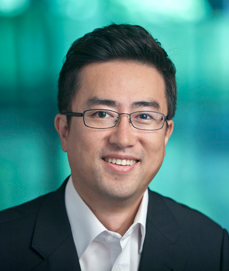Huh Lab Receives $1 Million for Organ-on-a-Chip Cancer Immunotherapy Research

The Cancer Research Institute, a nonprofit organization that supports research into immunotherapies for all forms of cancer, named Dan Dongeun Huh, Wilf Family Term Chair & Assistant Professor in the Department of Bioengineering, the recipient of its inaugural CRI Technology Impact Award.
The $1 million grant, paid over three years, will support Huh’s development of microchip-based research models that mimic human cancer and immune cell interactions.
The Huh lab has previously used microfabrication techniques to make organ-on-a-chip models of various anatomical systems, including lungs, eyes, and placentas. By embedding living human cells in microfluidic arrays, Huh and his colleagues can simulate biological processes in environments that replicate the ones found in the body.

The Huh lab’s new model will be engineered to form a network of living blood vessels that simulate the same vessels that immune cells use to circulate within the human body. Using this platform, Huh’s group will study the interactions between cancer cells with key components of the immune system involved in cancer elimination such as macrophages and T cells.
In addition to providing new insights that may lead to novel strategies to treat cancer with immunotherapy, Huh’s model may also function as a screening platform to test and predict the efficacy and safety of drugs without first requiring them to be tested in patients.
“There is an urgent need within the research community for new ways to model, observe, and interrogate complex interactions between the human immune system and tumors — a dynamic interplay that current two-dimensional cell cultures and animal models cannot characterize optimally,” said Jill O’Donnell-Tormey, Ph.D., CEO and director of scientific affairs at the Cancer Research Institute.
“Dr. Huh’s microchip-based human cancer models represent a highly innovative intersection of cell biology and microengineering, which, when applied to cancer immunotherapy research, may spur advances in our understanding of how malignant human tumors interact with the immune system and surrounding tissues, providing researchers with new insights that will lead to improved cancer treatments,” O’Donnell-Tormey added.
The CRI Technology Impact Award offers an opportunity for scientists to collaborate across disciplines on high-risk, high-reward research projects. The award enables cross-fertilization of expertise, ideas, and technologies — in this case, attracting an accomplished expert in bioengineering to the field of cancer immunotherapy. To carry out this project, Dr. Huh has teamed up with two immunologists at the University of Pennsylvania’s Perelman School of Medicine, E. John Wherry and G. Scott Worthen, who will oversee the investigation of cancer-immune cell interactions using Dr. Huh’s technology.
